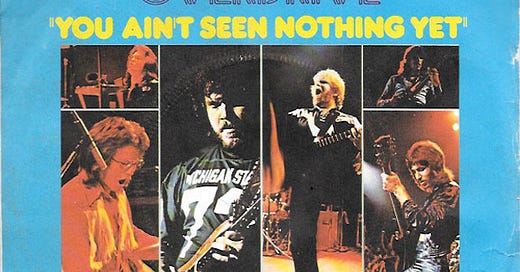Both readings today refer back to the first book of the bible, Genesis. That’s because not everything was clear from the very beginning. Just like individuals have to learn, grow, and mature, so too does humanity.
As religion and faith developed across the centuries, we learned to see the Hebrew Scriptures in a new light. Which isn’t to say they were wrong. In fact, we were wrong, and it took Jesus (and His Apostles and His Church) to understand that.
Reading 1
1 Jn 3:11-21
Beloved: This is the message you have heard from the beginning: we should love one another, unlike Cain who belonged to the Evil One and slaughtered his brother. Why did he slaughter him? Because his own works were evil, and those of his brother righteous. Do not be amazed, then, brothers and sisters, if the world hates you. We know that we have passed from death to life because we love our brothers. Whoever does not love remains in death. Everyone who hates his brother is a murderer, and you know that no murderer has eternal life remaining in him. The way we came to know love was that he laid down his life for us; so we ought to lay down our lives for our brothers. If someone who has worldly means sees a brother in need and refuses him compassion, how can the love of God remain in him? Children, let us love not in word or speech but in deed and truth.
Now this is how we shall know that we belong to the truth and reassure our hearts before him
in whatever our hearts condemn, for God is greater than our hearts and knows everything. Beloved, if our hearts do not condemn us, we have confidence in God.
John goes all the way back to the beginning, to the first murder, to teach us how we should treat each other. (Notice it’s not the first sin—Adam and Eve eating the apple was a sin against God; murder is the first sin of one person against another.)
We have to love one another. But “love” isn’t just a word. It’s an action. That’s why hhe says we ought to lay down our own lives, not just talk about it.
John keeps referring to “the truth,” but for John, truth isn’t about just saying the right thing, but doing the right thing.
Responsorial Psalm
PS 100:1b-2, 3, 4, 5
R. Let all the earth cry out to God with joy.
Sing joyfully to the LORD, all you lands;
serve the LORD with gladness;
come before him with joyful song.
R. Let all the earth cry out to God with joy.
Know that the LORD is God;
he made us, his we are;
his people, the flock he tends.
R. Let all the earth cry out to God with joy.
Enter his gates with thanksgiving,
his courts with praise;
Give thanks to him; bless his name.
R. Let all the earth cry out to God with joy.
The LORD is good:
the LORD, whose kindness endures forever,
and his faithfulness, to all generations.
R. Let all the earth cry out to God with joy.
The Psalmist invites all people to praise God. Although the Israelites have a special place in God’s plan (“the flock he tends”), everyone is invited to enter His gates.
His faithfulness extends from the patriarchs (who get a mention below) to this day. And because God is eternal, we have to do our best to understand His actions in all places and times, not just with the Chosen People in ancient times.
Alleluia
R. Alleluia, alleluia.
A holy day has dawned upon us.
Come, you nations, and adore the Lord.
Today a great light has come upon the earth.
R. Alleluia, alleluia.
John likes to use “light” as a metaphor, because he’s especially interested in illuminating the reader with God’s truth, which may have been buried in ancient stories and prophesies. Jesus is the light that helps us see.
Gospel
Jn 1:43-51
Jesus decided to go to Galilee, and he found Philip. And Jesus said to him, "Follow me."
Now Philip was from Bethsaida, the town of Andrew and Peter. Philip found Nathanael and told him, "We have found the one about whom Moses wrote in the law, and also the prophets, Jesus, son of Joseph, from Nazareth."
But Nathanael said to him, "Can anything good come from Nazareth?"
Philip said to him, "Come and see."
Jesus saw Nathanael coming toward him and said of him, "Here is a true child of Israel.
There is no duplicity in him."
Nathanael said to him, "How do you know me?"
Jesus answered and said to him, "Before Philip called you, I saw you under the fig tree."
Nathanael answered him, "Rabbi, you are the Son of God; you are the King of Israel."
Jesus answered and said to him, "Do you believe because I told you that I saw you under the fig tree? You will see greater things than this." And he said to him, "Amen, amen, I say to you, you will see the sky opened and the angels of God ascending and descending on the Son of Man."
We’re not sure what Nathaneal had a against Nazareth. It’s probably no bigger a deal than rivalries between modern cities, like how Angelinos don't care for New Yorkers.1
The thing is, “Nazarene” is a pun. As noted last weekend, Matthew alludes to a prophesy that the Messiah would be from Nazareth, though we don’t have any such mention in the Old Testament. St. Jerome2 noted that “Nazarene” was a Greek transliteration of the Hebrew netzer, which means “branch.” In other words, Jesus of Nazareth is from branch of Jesse, the father of King David.
It’d be a bit like someone saying “He’s of the angels,” and someone else3 responding, “Can anything good come out of Los Angeles?”
But the pun is inadvertent, which is why Jesus says Nathaneal has no duplicity in him. And that in itself is probably sardonic, since Jacob (who’s name was later changed to Israel) is one of the most duplicitous characters in the Bible.4
Anyway, now that I’ve explained 2,000 year old sarcasm, I think it’s worth pointing out the really important point. Jesus tells Nathaneal He saw him under a fig tree, which, of course, he couldn’t actually see with his eyes.
This minor miracle is enough for Nathaneal to become a disciple, but Jesus is all
You’re going to see “angels of God ascending and descending.” What does that remind me of? Oh yeah, Jacob’s Ladder.5 Jesus calls Nathaneal "Israel" (i.e. Jacob), and tells him he'll see what Jacob saw.
Because the Old Testament points us to the New, and the New Testament fulfils the Old. It’s all tied together. Nathaneal couldn’t have seen any of this coming, God had seen it from the Beginning.
And no less petty.
You know, the guy who translated the entire bible into Latin. (His translation is what we now call the Vulgate.)
Probably a New Yorker.





